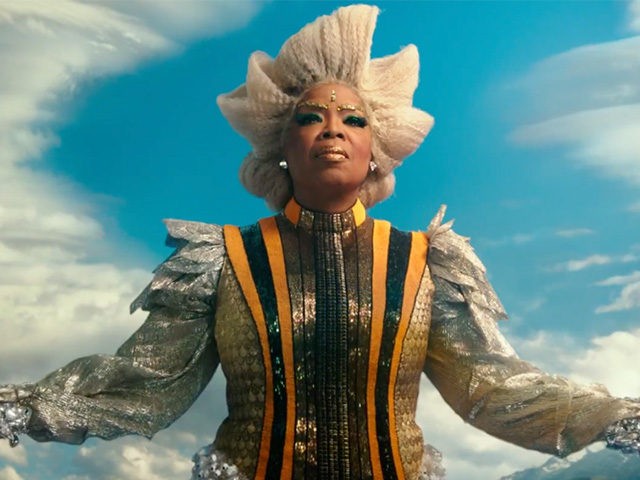Walt Disney, the studio that, on top of its own stellar brands, owns the Star Wars, Pixar, and Marvel franchises, is a money-printing hit machine, but thanks to director Ana DuVernay’s A Wrinkle in Time, it is not a flawless one.
Despite the presence of the some of the biggest stars in the world (Oprah Winfrey, Reese Witherspoon, Chris Pine), despite coming from a children’s novel beloved for decades, despite the second-to-none marketing machine that is the Magic Kingdom, the movie was an economic catastrophe.
Globally, not just here in North America, but worldwide, Wrinkle grossed just $127 million. After tanking out at $96 million domestically, a Disney movie starring Oprah Winfrey was only able to gross an additional $31 million in 20-plus other countries.
With a production and advertising budget that reports peg at somewhere between $150 million and $250 million, that means the red ink landed somewhere between $86 million and $186 million, according to Yahoo News.
As Breitbart News reported at the time, the crucial mistake the filmmakers and Disney made was removing the Christianity from what is essentially a Christian children’s book.
My point is not that this act of anti-Christian bigotry hurt the movie by offending moviegoers, but that this act of bigotry stripped Wrinkle of if its central themes, and by extension, of all the substance and human insight that comes with Christian themes, which are also universal themes. According to countless reviews, what was left was a confection of empty calories: lovely CGI on the outside and a black hole of meaningless spirituality on the inside.
Although the predominantly left-wing entertainment media is predisposed to give a black, female director like DuVernay every benefit of the doubt, Wrinkle was mostly panned by critics who found the film pretty but ultimately insignificant.
“[T]here’s something about ‘A Wrinkle in Time’ overall that doesn’t take flight. It doesn’t fall to the ground, either, just sort of hovers when it should soar. It’s conscientious. It’s watchable, and it’s never less than competent. But it seems to strive so hard to be inspirational, rather than letting the inspiration come through the story, that it becomes preachy and self-conscious,” wrote the San Francisco Chronicle.
Writing at Insider, Kim Renfro said the “movie really suffers” from the decision to “ditch the book’s explicit Christian references.” As a result she found the movie “incomplete” and says that the “biblical inspirations could have (and should have) been replaced with a more cohesive plot that carried the film to its final climax.”
Even the far-left Vox admitted that the book was “deeply informed by its author’s Episcopal Christianity” which “the new Disney movie has excised.”
Hollywood’s hatred of Christianity comes with a price, but one the studios are willing to pay. Unfortunately for shareholders, Disney and DuVernay satisfying their own prejudices is more important than profits and the telling of a decent story.
Follow John Nolte on Twitter @NolteNC. Follow his Facebook Page here.

COMMENTS
Please let us know if you're having issues with commenting.